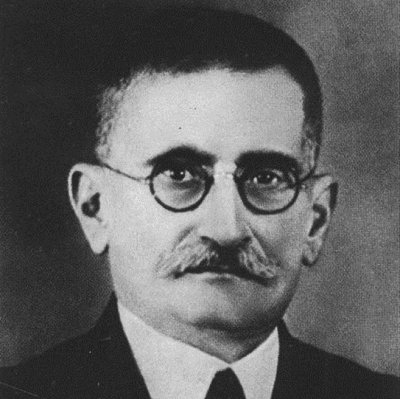
Khalil Baidas
خليل بيدس
Khalil Baidas was born in Nazareth. His father was Ibrahim; his mother was Warda. He and his wife, Adèle Abu al-Rus, had a son, Yusuf.
He began his elementary school education at the Greek Orthodox School in Nazareth. He then enrolled in the Russian Teachers’ College in Nazareth where he remained for six years. Subsequently he became headmaster of the Russian elementary school in Homs, Syria. Later he was transferred to the Russian elementary school in Baskinta, Lebanon; to the Suq al-Gharb school; and then to the Jdaidet Marja‘uyun school, all in Lebanon.
In 1908, Baidas was transferred to the Orthodox School in Haifa where, following the restoration of the Ottoman Constitution, he published the weekly magazine called Al-Nafa’is, which in 1909 became the bimonthly Al-Nafa’is al-Asriyya. In 1911, the magazine was published from Jerusalem but ceased publication when World War I began. It resumed publication in 1919 but finally closed down in 1923. The magazine was widely distributed in a number of Arab and foreign countries and many of the most eminent literary figures and poets of Palestine and of the Arab world published their work in it.
In 1911, Baidas was chosen to represent the Christian Orthodox Arabs in the Mixed Council formed by the Ottoman government to manage the affairs of the Arab Orthodox community and supervise Orthodox awqaf in Palestine and Transjordan. So he resigned from his post at the Orthodox School in Haifa and settled in Jerusalem.
From an early period Baidas was concerned with Zionist immigration and warned of its dangers. In articles he published in Al-Ahram and Al-Muqattam, he called on the Ottoman authorities to deal justly with the Arabs and to show them fairness. When the Arab Revolt broke out in June 1916, Baidas was sentenced to death but sought refuge in the Orthodox Patriarchate in Jerusalem, which protected him and saved him from the gallows.
In 1920, Baidas took part in a demonstration in Jerusalem and spoke against the danger of the Balfour Declaration. He was arrested by the British and sentenced to fifteen years in jail. While in Acre prison, Baidas wrote a short book describing the imperialist prison system and the barbaric treatment of nationalist prisoners. The British High Commissioner, Herbert Samuel, later on issued a pardon, which included both him and other political prisoners, both Arabs and Jews. Thereafter, Baidas was appointed teacher of Arabic at the St. George’s School, a post he held until his retirement in 1945.
Baidas amassed a very valuable library containing a number of precious manuscripts and printed books, all of which was lost when, in 1948, the Zionist militias occupied his quarter and he was forced to vacate his house in Jerusalem and to walk on foot to the village of Silwan. He was 73 years old. From Silwan he moved to Amman and Beirut where he died soon thereafter, in 1949. He was buried in Beirut.
Khalil Baidas was a man of letters, a novelist, a translator of the first rank, and an inspired orator. He was instrumental in moving the Palestinian novel in new and more realistic directions that dealt with people’s ordinary lives. He was influenced by great Russian writers like Pushkin and Tolstoy and is regarded as a pioneer of translations from Russian into Arabic. He called for a cultural awakening in the Arab world and left behind some 44 books that he had written or translated.
In January 1990, the PLO awarded him the Jerusalem Medal for Culture, Arts and Literature.
Selected Writings
"العقد النظيم في اصل الروسيين واعتناقهم الايمان القويم". بعبدا: المطبعة العثمانية، 1897.
[The Origins of the Russians and their Conversion to the True Faith]
"الطبيب الحاذق". بيروت: 1898.
[The Skillful Physician]
"العقد الثمين في تربية البنين". بعبدا: المطبعة العثمانية، 1898.
[The Precious Necklace on Child-raising]
"الوارث: رواية اجتماعيّة غراميّة". القدس: 1920.
[The Heir: A Social and Romantic Novel]
"مسارح الأذهان: مجموعة أدبية فنية روائية في حقيقة الحياة". القاهرة: المطبعة العصرية، 1924.
[Pastures of Thought: A Literary, Artistic and Fictional Collection Dealing with Real Life]
"العرب، أبطالهم وأشهر حوادثهم". القدس، 1942.
[The Arabs: Their Heroes and Most Famous Historical Incidents]
Translations
Pushkin, The Captain’s Daughter. Beirut, 1898.
Akim Alekseyevich Olesnitsky, A Description of the Holy Land. Beirut, 1898.
Tolstoy, The Terrors of Totalitarianism. Haifa, 1909; Cairo, 1929.
Sources
Abdul Hadi, Mahdi, ed. Palestinian Personalities: A Biographic Dictionary. 2nd ed., revised and updated. Jerusalem: Passia Publication, 2006.
Descamps-Wassif, Sara. Dictionnaire des écrivains palestiniens. Paris: Institut du monde arabe, 1999.
العودات، يعقوب. "من أعلام الفكر والأدب في فلسطين". عمّان: د. ن.، 1976.
"الموسوعة الفلسطينية"، القسم العام، المجلد الثاني. دمشق: هيئة الموسوعة الفلسطينية، 1984.
نويهض، عجاج. "رجال من فلسطين". بيروت: منشورات فلسطين المحتلة، 1981.